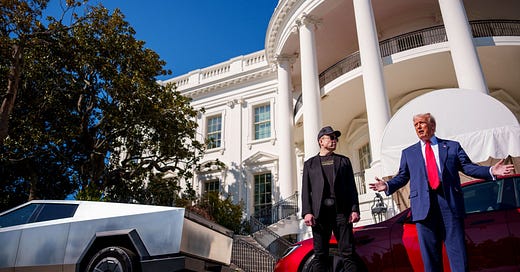
The Free Press

“It’s Tesla, baby!” tweeted Lily Tang Williams, posting a video of herself in a tie-dyed sweatshirt inside her brand-new Tesla Model Y. A twice-defeated Republican congressional candidate in New Hampshire, Williams told her X followers that she had bought the car to support Elon Musk and DOGE. “We, the free people, must defeat the leftists/Marxists/communist mobs or they will destroy America!” she wrote.
When I caught up with Williams a few days later, she told me she hadn’t even driven the car yet. “I need to practice. I’m not a very good driver,” she laughed. But she said it was important for conservatives to support Tesla and its CEO now that the left had turned against them. “We must win, as a free people,” she said.
Because of Musk’s support for Trump—and the Tesla CEO’s subsequent role as the president’s hatchet man—many liberal Tesla owners have been desperate to sell their once-prized cars. Indeed, in the past few days, more radical Musk-haters have gone much further, spray-painting graffiti on Teslas, setting charging stations on fire, and even throwing Molotov cocktails at Tesla vehicles.
On Tuesday, President Trump, once a vociferous critic of electric vehicles (“They don’t go far. They cost a fortune”), got into the act, turning the White House lawn into a Tesla showroom during a half-hour news conference. After prompting Musk to give a sales pitch about the wonders of full autonomous driving—a feature he has promised for years—the president said that he planned to buy a Tesla himself, a red Model S. Without asking for a discount, the president added.
“I think he’s been treated very unfairly by a very small group of people,” Trump said of Musk. “And I just want people to know that he can’t be penalized for being a patriot.”
The old saw that businesses can only hurt themselves by getting involved in politics has been violated often in recent years. Think Starbucks calling on its baristas to talk about race relations with its customers. Or quarterback Colin Kaepernick “taking a knee” before games, to the ire of the NFL’s conservative fans. Or Bud Light building a promotion around a transgender influencer—a mistake from which the brand has yet to recover.
But these examples pale compared to the Tesla saga. Its sleek electric vehicles, which range in price from $42,490 to $125,490, have become a kind of Rorschach test for car buyers on both sides of the political divide. That’s in part because, unlike most companies, Tesla was never completely apolitical. The mere fact that Musk was creating a category of vehicle that would never rely on fossil fuels made it, by definition, a company aimed at liberal environmentalists.
That wasn’t Tesla’s only appeal, of course; the cars were fast, quiet, sleek, and full of cool technology. But a former Tesla associate recalls that Musk’s language back then was all about sustainability. “He was going to save the planet with these vehicles,” she recalls. (“SpaceX,” she added, “was in the backdrop—it was going to get to Mars in case that effort failed.”)
“Liberals were central to Tesla’s marketing,” explained Ed Niedermeyer, a longtime Tesla critic and author of Ludicrous: The Unvarnished Story of Tesla Motors. “The initial sales pitch was this is a cool, sexy car, but by buying it you are financing the EV future. That was clearly a guilty liberal pitch,” he told me. It especially appealed to buyers in liberal California. From the start, California was Tesla’s biggest market.
“It used to be highly associated with left-leaning tech types”—guys who admired Musk and the extraordinary automotive technology Tesla was bringing to market, said Paul Argenti, a corporate communications professor at Dartmouth’s Tuck School of Business. In the same way that Steve Jobs had been the face of Apple, Argenti said, Musk was the face of Tesla. When investors bought the stock, they were betting on the CEO even more than the company itself.
One such investor was Ross Gerber, the CEO of Gerber Kawasaki, a Santa Monica wealth management firm with over $3.3 billion in assets. He told me that while he strongly believed in the mission—“If Tesla succeeds,” he remembers thinking, “it will be such a huge win for society”—his investment was based even more on Musk.
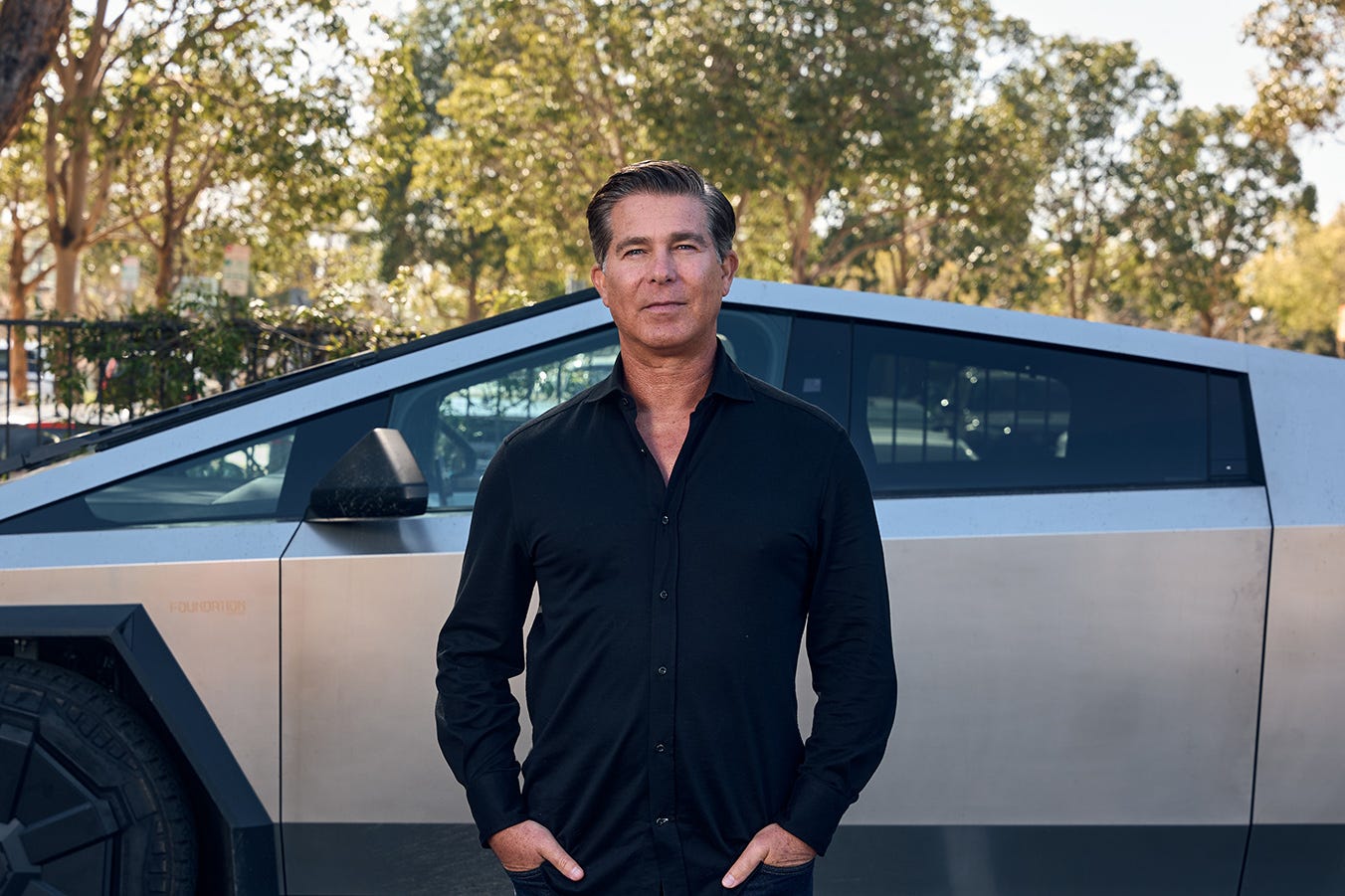
“What made Tesla successful was the fact that Elon Musk was there every day on the factory floor,” Gerber told me. So long as Musk was laser-focused on Tesla, Gerber had confidence in the company’s prospects. At one point, he said, he had $250 million invested in Tesla.
But then things started to change. During Covid, Musk refused to shut down his factory. He also claimed his transgender daughter was—in his words—“killed by the woke mind virus.” Neither went over well in California, said Gerber.
In 2021, President Biden didn’t invite Musk to a White House EV summit, which infuriated the Tesla CEO, whose company sold by far the most EVs in the world. The following year, Musk bought Twitter (and changed the name to X) and made it a haven for the right, causing many liberals to abandon the social media platform.
As Musk became ever more closely associated with Trump—endorsing him in July 2024 after the first assassination attempt; spending $250 million to help him become president; and then shutting down federal programs and axing government workers as the head of DOGE—Tesla’s original constituency turned against him. They didn’t want to be seen in a car that suggested they had put money in Musk’s pocket.
“Musk was already crazy, but that was cool,” said Argenti. “Then he became crazy and political. That’s just bad business.”
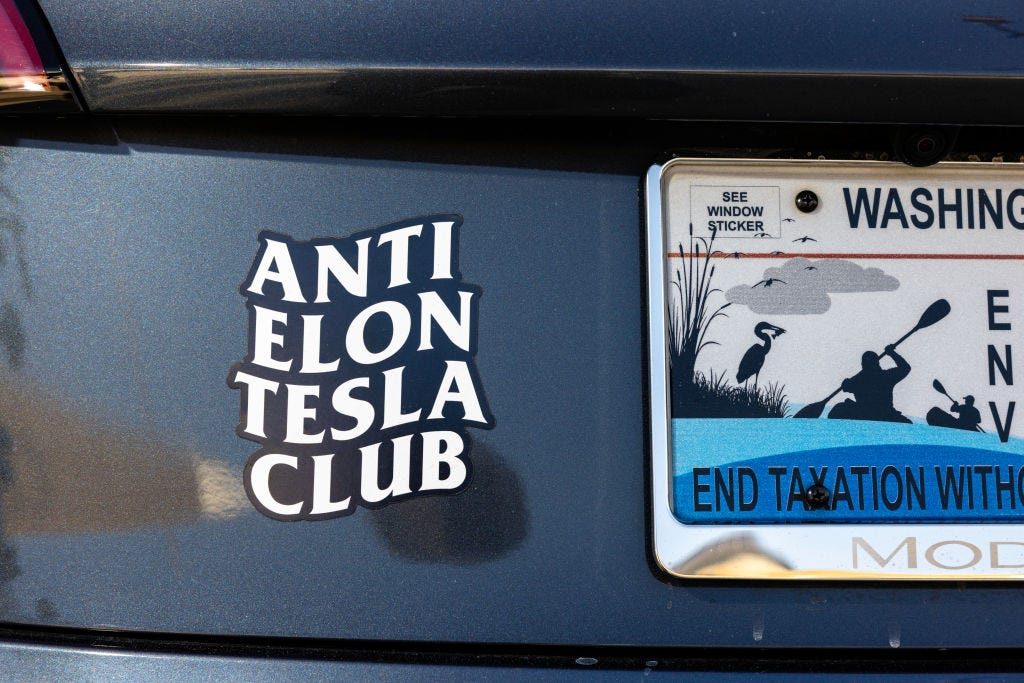
I spoke to a half dozen liberals who were trying to ditch their Teslas—but I could have easily spoken to a hundred. “I just couldn’t be associated with him any longer,” said Jesse Hinson, an Atlanta tech worker, in a typical comment. “Every action he’s taken [as the head of DOGE] has gone against the poorest people.” Hinson told me that he had replaced his Tesla Model Y with a Chevy Equinox EV. When a Tesla dealer reached out with a last-ditch sales pitch, Hinson responded, “I won’t be buying another Tesla.”
Rachel Randall, a Massachusetts-based surgical technologist, was also trying to unload her Model Y, which she hopes to replace with a non-Tesla EV. But she was having trouble selling it. “Low demand,” she texted. In the meantime, her husband bought her two bumper stickers to put on her Model Y. One reads: “Anti Elon Tesla Club.” The other says, “I Bought This Before We Knew Elon Was Crazy.”
“Over the last two years we get phone calls all the time about how people are sick of him and they don’t like him and they have his car and they want to get rid of it,” said Adam Slobin, who sells used Teslas at his brokerage DriveWise Auto in Los Angeles.
The liberal revolt against Tesla has had a significant impact on the company’s bottom line. Just since December, the stock has fallen around 45 percent and lost all of its Trump sky-high honeymoon. Last year, deliveries declined for the first time ever—even as total EV sales rose worldwide. They are bound to get even worse in 2025 as Tesla’s European sales have absolutely collapsed, due to “hostility” toward Musk, according to The Times of London. At year-end, Tesla was not even the best-selling electric vehicle company anymore. That title went to the Chinese upstart BYD.
Fred Lambert, editor-in-chief of Electrek and a longtime Tesla bull, sold all his stock. “I no longer feel like the original mission to accelerate the advent of sustainable transport or renewable energy is a priority,” he wrote.
An anonymous Reddit user summed up Tesla’s image problem this way: “I can’t remember a time a brand has gone from ‘hey cool car don’t you love it’ to ‘fuck off nazi’ in about 2-3 years. Wild.”
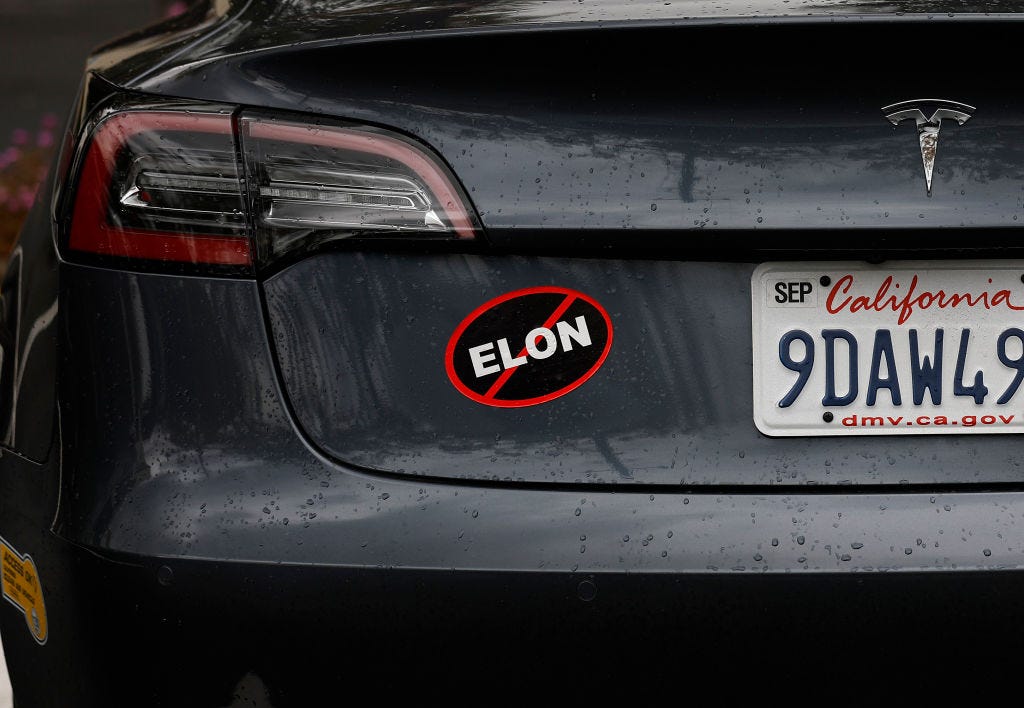
Lately MAGA has entered the fray, turning Tesla cars into right-wing totems. And it’s not just Lily Tang Williams and President Trump. On X, a podcaster named Tim Pool posted, “i already own 3 teslas but because it will own the libs im guna buy a second cybertruck and have it self drive behind my other cybertruck everywhere i go.”
I spoke to Jennie Heinl, a health clinic administrator from Pittsburgh, who served two weeks in jail after pleading guilty for her role in the January 6, 2021 riot at the Capitol. (She walked through the Capitol, and was later pardoned by Trump.)
“I looked at Teslas seven years ago and I didn’t pull the trigger just because I didn’t buy into it,” she told me. But she gave Tesla another look “when I saw Elon get on the Trump train.” And though she’s not sure conservatives will shed their EV skepticism, “I think a lot of people on the right are looking at Elon differently than they did before,” she said.
“I want someone to DOGE the city of Pittsburgh. I want everything DOGE’d,” she laughed.
To her delight, she loves her new Tesla Model Y. “I’ve had cars that are BMW M2s. These cars are faster than that,” she said. Heinl is amazed by the car’s self-driving, “which is insane. It knows where to stop. It knows when to stop. I was driving down the highway going 75 miles an hour and the car merged without me doing anything.”
She does have one concern: “I want to support him the most I can, but I’m also a little cautious. Am I going to get spray-painted or my windows broken?”
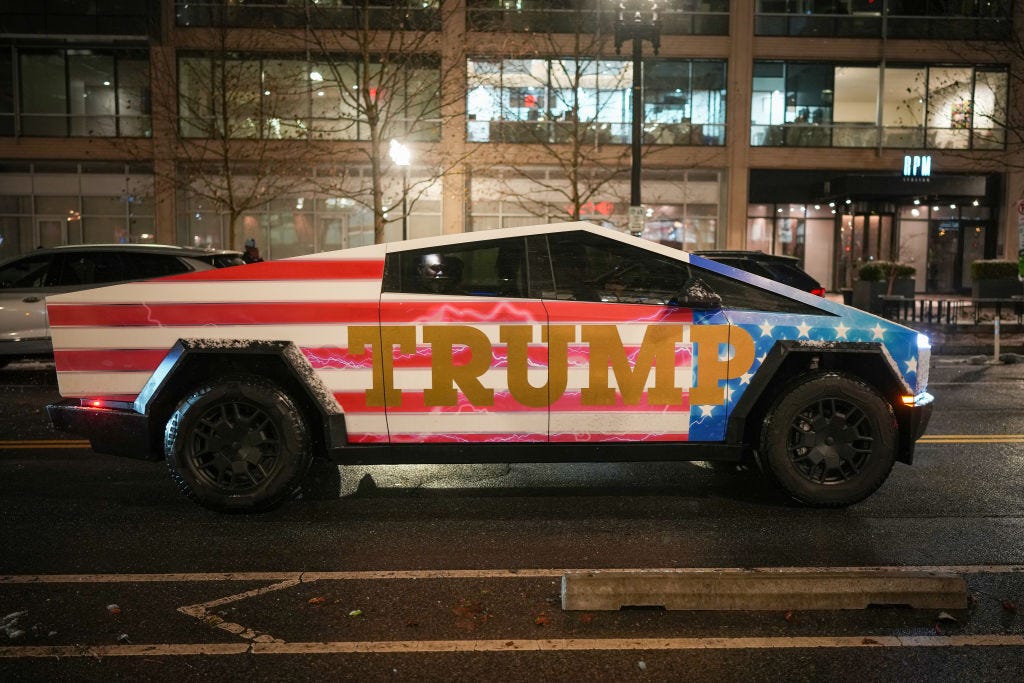
Will Trump’s endorsement and Musk’s work with DOGE make a Tesla a MAGA must-have? To put it another way, are there enough buyers on the right to make up for the loss of buyers on the left?
Alex Roy, a writer and Tesla owner who has set records for the fastest cross-country drive in an EV, told me that “it’s entirely possible that lost sales may be offset by new sales.” Looking like a Tesla-styled Joe Rogan with his shiny bald head and muscular turtleneck as we FaceTimed, Roy argued Trump’s election and the center-right’s push for reindustrialization and reshoring align with a typical Tesla owner’s longtime desire for energy independence. “The appeal of the Tesla brand is wide,” he said.
And it’s true. Tesla is growing in red states. Texas, where Musk moved Tesla’s headquarters, has seen registrations increase 34 percent to nearly 200,000 vehicles since February 2024, according to data published by Dallas-Fort Worth Clean Cities. In Florida, Teslas accounted for 62 percent of the state’s total EV registrations in 2024, according to the state’s Department of Motor Vehicles.
But these numbers are dwarfed by California’s 1.6 million-strong EV market. In fact, California sold 130,000 more EVs in 2024 than there were total EVs in Texas. And in California, Tesla sales declined 12 percent in 2024 while sales of non-Tesla electric cars rose 12.8 percent, according to the California New Car Dealers Association.
Tesla still does have some advantages. Its technology still dazzles, and it owns a nationwide network of charging stations that no other EV company can claim. Indeed, Trump shut down $5 billion in federal funds the Biden administration had allocated to just such a network that Tesla’s competitors could share. On the other hand, it also has a disadvantage that it once didn’t have: Tesla is no longer the only game in town. “Tesla had a monopoly on the EV market,” said Adam Slobin, the used Tesla dealer. “Now every manufacturer has some level of an electric car.”
“The company is not the new, exciting, shiny penny anymore. And that happens,” Argenti said.
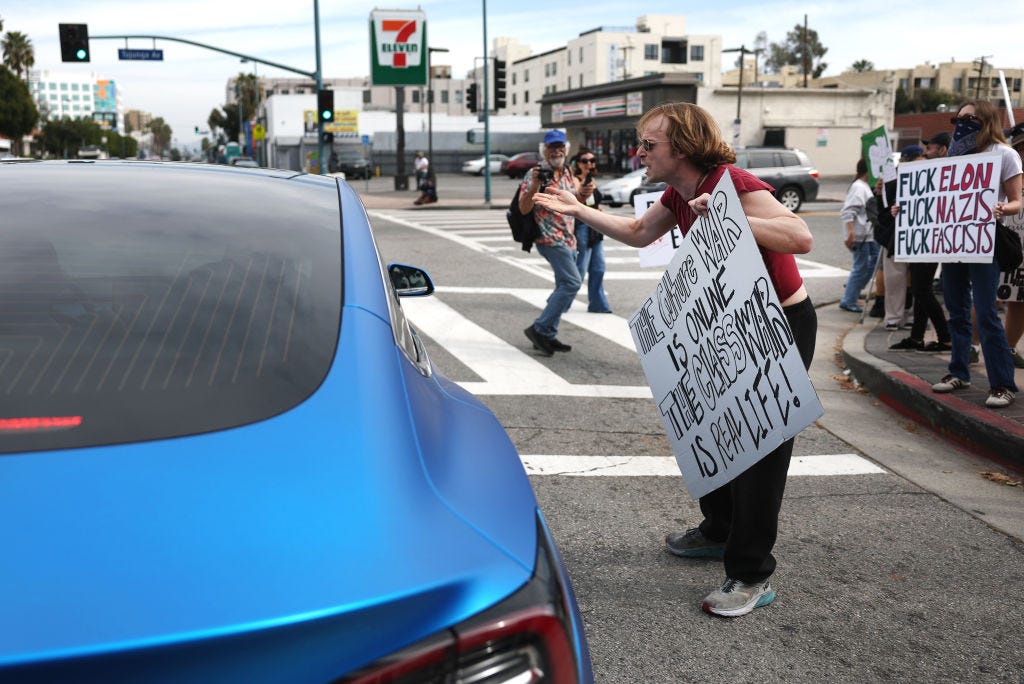
Niedermeyer, who remains largely skeptical of Tesla’s prospects, said that he nonetheless believes that pitching Teslas to conservatives could work if it were better planned and sustained. “The reality is that Tesla’s buyer base is more apolitical than anything. They may even lean Trump, but don’t want the drama of being visibly associated with him,” he said.
“What this does is make Tesla a rolling MAGA hat,” Niedermeyer said.
And besides, he added, Trump supporters don’t need a Tesla to tell the world where they stand. “Trump supporters have their cultural signifiers in the automotive world, and they’re Ram trucks,” he said.
Ethan Dodd is a journalist who lives in Washington, D.C., and focuses on business and economics.


